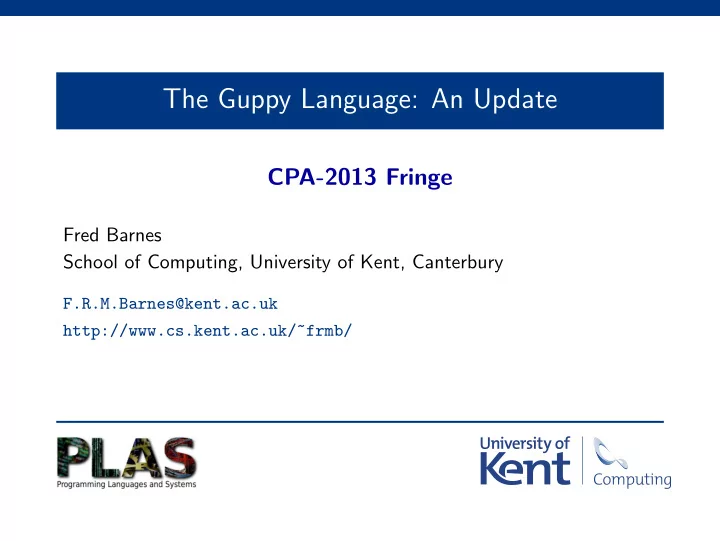

The Guppy Language: An Update CPA-2013 Fringe Fred Barnes School of Computing, University of Kent, Canterbury F.R.M.Barnes@kent.ac.uk http://www.cs.kent.ac.uk/~frmb/
Previously Last Time ... ... at CPA-2011 . I talked about a possible successor language to occam-pi: Guppy . we’re still trying to think up a better name...! We’re still using occam-pi, of course. adding new things and fixing bugs as we go. Why..? occam-pi is a bolt-on (kind of) to occam: and built into the existing occam compiler (circa 1990s). hard to add new things. perception issues with the name, too. :-(
Previously Last Time ... ... at CPA-2011 . I talked about a possible successor language to occam-pi: Guppy . we’re still trying to think up a better name...! We’re still using occam-pi, of course. adding new things and fixing bugs as we go. Why..? occam-pi is a bolt-on (kind of) to occam: and built into the existing occam compiler (circa 1990s). hard to add new things. perception issues with the name, too. :-(
Previously Last Time ... ... at CPA-2011 . I talked about a possible successor language to occam-pi: Guppy . we’re still trying to think up a better name...! We’re still using occam-pi, of course. adding new things and fixing bugs as we go. Why..? occam-pi is a bolt-on (kind of) to occam: and built into the existing occam compiler (circa 1990s). hard to add new things. perception issues with the name, too. :-(
Previously What We Need ... (last time) Preserving the useful features of occam/occam-pi: embodiment of CSP based concurrency (though may not restrict to that alone) in the language itself. strict parallel usage checks: zero aliasing. Preserving the fast execution of the resulting code: no heavy run-time checks (e.g. expensive run-time typing, complex garbage collection). using existing CCSP. Targetable at just about any architecture in existence: by compiling (ultimately) to LLVM (low-level virtual machine).
Previously What We Would Like ... (last time) A language that other people would be happy to (and may even want to ) use: successes of Python and Go suggest indentation-based layout and concurrency are not distasteful. Rapid development – nothing overly cumbersome to program with respect to other languages: need some genericity/flexibility in the type system automatic ‘ SEQ ’ behaviour (static checks can spot likely errors) may need to sacrifice some of the purity of occam to make this work.. Automatic mobility (largely a compiler thing), with a couple of language hints thrown in to help the compiler when automatic static analysis gets too complex (or wrong). A proper ‘ string ’ type with Unicode support.
Now Current State Have implemented some of the language. in the NOCC compiler framework (which also grew an AVR assembler recently). Currently generating C code from Guppy sources: a known quantity when it comes to debugging, etc. interfaces with the existing run-time system (CCSP [1]) using CIF [2]. Recently, managed to compile and run the commstime benchmark! ... insert live demonstration ...
Now Current State Have implemented some of the language. in the NOCC compiler framework (which also grew an AVR assembler recently). Currently generating C code from Guppy sources: a known quantity when it comes to debugging, etc. interfaces with the existing run-time system (CCSP [1]) using CIF [2]. Recently, managed to compile and run the commstime benchmark! ... insert live demonstration ...
Now Current State Have implemented some of the language. in the NOCC compiler framework (which also grew an AVR assembler recently). Currently generating C code from Guppy sources: a known quantity when it comes to debugging, etc. interfaces with the existing run-time system (CCSP [1]) using CIF [2]. Recently, managed to compile and run the commstime benchmark! ... insert live demonstration ...
Now Comparison with occam-pi Not as efficient, but close. run-time kernel calls impose some overhead: optimised for occam-pi. more memory required, e.g. commstime: 132 words for occam-pi, 434 for Guppy. commstime is perhaps not a good benchmark, but not got enough compiler support for hard-core computational code yet! Because we go via CIF into the run-time, can (in principle) co-exist with occam-pi processes. useful in various ways. Get it here: http://github.com/concurrency/kroc http://github.com/concurrency/nocc (and then you have to figure out how to make it fly, ...)
Now Questions?
References References [1] C.G. Ritson, A.T. Sampson, and F.R.M. Barnes. Multicore scheduling for lightweight communicating processes. Science of Computer Programming , 77(6):727–740, June 2012. [2] F.R.M. Barnes. Interfacing C and occam-pi. In J.F. Broenink, H.W. Roebbers, J.P.E. Sunter, P.H. Welch, and D.C. Wood, editors, Proceedings of Communicating Process Architectures 2005 . IOS Press, September 2005.
Recommend
More recommend